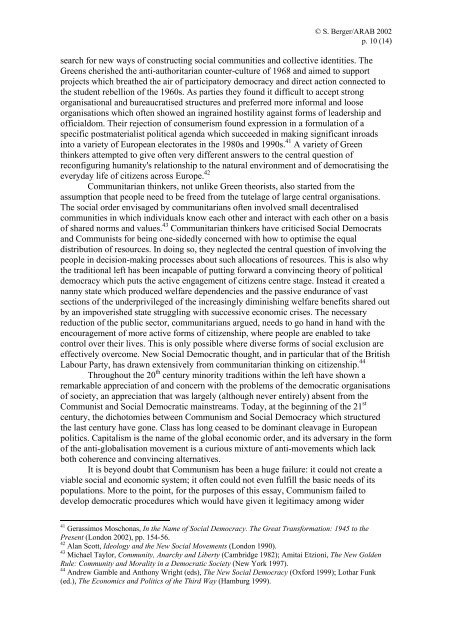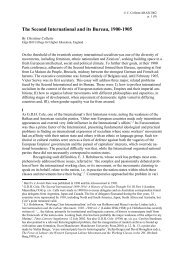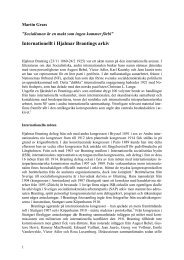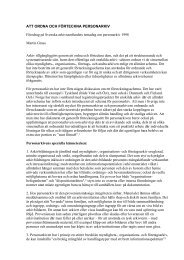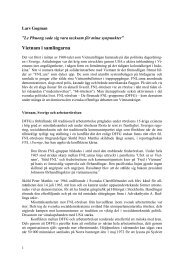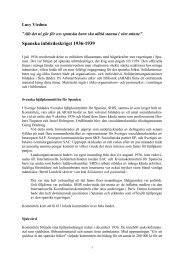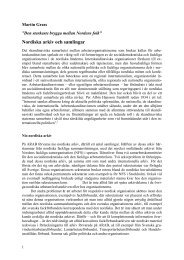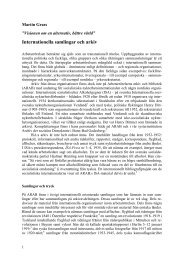Communism, Social Democracy and the Democracy Gap
Communism, Social Democracy and the Democracy Gap
Communism, Social Democracy and the Democracy Gap
Create successful ePaper yourself
Turn your PDF publications into a flip-book with our unique Google optimized e-Paper software.
© S. Berger/ARAB 2002<br />
p. 10 (14)<br />
search for new ways of constructing social communities <strong>and</strong> collective identities. The<br />
Greens cherished <strong>the</strong> anti-authoritarian counter-culture of 1968 <strong>and</strong> aimed to support<br />
projects which brea<strong>the</strong>d <strong>the</strong> air of participatory democracy <strong>and</strong> direct action connected to<br />
<strong>the</strong> student rebellion of <strong>the</strong> 1960s. As parties <strong>the</strong>y found it difficult to accept strong<br />
organisational <strong>and</strong> bureaucratised structures <strong>and</strong> preferred more informal <strong>and</strong> loose<br />
organisations which often showed an ingrained hostility against forms of leadership <strong>and</strong><br />
officialdom. Their rejection of consumerism found expression in a formulation of a<br />
specific postmaterialist political agenda which succeeded in making significant inroads<br />
into a variety of European electorates in <strong>the</strong> 1980s <strong>and</strong> 1990s. 41 A variety of Green<br />
thinkers attempted to give often very different answers to <strong>the</strong> central question of<br />
reconfiguring humanity's relationship to <strong>the</strong> natural environment <strong>and</strong> of democratising <strong>the</strong><br />
everyday life of citizens across Europe. 42<br />
Communitarian thinkers, not unlike Green <strong>the</strong>orists, also started from <strong>the</strong><br />
assumption that people need to be freed from <strong>the</strong> tutelage of large central organisations.<br />
The social order envisaged by communitarians often involved small decentralised<br />
communities in which individuals know each o<strong>the</strong>r <strong>and</strong> interact with each o<strong>the</strong>r on a basis<br />
of shared norms <strong>and</strong> values. 43 Communitarian thinkers have criticised <strong>Social</strong> Democrats<br />
<strong>and</strong> Communists for being one-sidedly concerned with how to optimise <strong>the</strong> equal<br />
distribution of resources. In doing so, <strong>the</strong>y neglected <strong>the</strong> central question of involving <strong>the</strong><br />
people in decision-making processes about such allocations of resources. This is also why<br />
<strong>the</strong> traditional left has been incapable of putting forward a convincing <strong>the</strong>ory of political<br />
democracy which puts <strong>the</strong> active engagement of citizens centre stage. Instead it created a<br />
nanny state which produced welfare dependencies <strong>and</strong> <strong>the</strong> passive endurance of vast<br />
sections of <strong>the</strong> underprivileged of <strong>the</strong> increasingly diminishing welfare benefits shared out<br />
by an impoverished state struggling with successive economic crises. The necessary<br />
reduction of <strong>the</strong> public sector, communitarians argued, needs to go h<strong>and</strong> in h<strong>and</strong> with <strong>the</strong><br />
encouragement of more active forms of citizenship, where people are enabled to take<br />
control over <strong>the</strong>ir lives. This is only possible where diverse forms of social exclusion are<br />
effectively overcome. New <strong>Social</strong> Democratic thought, <strong>and</strong> in particular that of <strong>the</strong> British<br />
Labour Party, has drawn extensively from communitarian thinking on citizenship. 44<br />
Throughout <strong>the</strong> 20 th century minority traditions within <strong>the</strong> left have shown a<br />
remarkable appreciation of <strong>and</strong> concern with <strong>the</strong> problems of <strong>the</strong> democratic organisations<br />
of society, an appreciation that was largely (although never entirely) absent from <strong>the</strong><br />
Communist <strong>and</strong> <strong>Social</strong> Democratic mainstreams. Today, at <strong>the</strong> beginning of <strong>the</strong> 21 st<br />
century, <strong>the</strong> dichotomies between <strong>Communism</strong> <strong>and</strong> <strong>Social</strong> <strong>Democracy</strong> which structured<br />
<strong>the</strong> last century have gone. Class has long ceased to be dominant cleavage in European<br />
politics. Capitalism is <strong>the</strong> name of <strong>the</strong> global economic order, <strong>and</strong> its adversary in <strong>the</strong> form<br />
of <strong>the</strong> anti-globalisation movement is a curious mixture of anti-movements which lack<br />
both coherence <strong>and</strong> convincing alternatives.<br />
It is beyond doubt that <strong>Communism</strong> has been a huge failure: it could not create a<br />
viable social <strong>and</strong> economic system; it often could not even fulfill <strong>the</strong> basic needs of its<br />
populations. More to <strong>the</strong> point, for <strong>the</strong> purposes of this essay, <strong>Communism</strong> failed to<br />
develop democratic procedures which would have given it legitimacy among wider<br />
41 Gerassimos Moschonas, In <strong>the</strong> Name of <strong>Social</strong> <strong>Democracy</strong>. The Great Transformation: 1945 to <strong>the</strong><br />
Present (London 2002), pp. 154-56.<br />
42 Alan Scott, Ideology <strong>and</strong> <strong>the</strong> New <strong>Social</strong> Movements (London 1990).<br />
43 Michael Taylor, Community, Anarchy <strong>and</strong> Liberty (Cambridge 1982); Amitai Etzioni, The New Golden<br />
Rule: Community <strong>and</strong> Morality in a Democratic Society (New York 1997).<br />
44 Andrew Gamble <strong>and</strong> Anthony Wright (eds), The New <strong>Social</strong> <strong>Democracy</strong> (Oxford 1999); Lothar Funk<br />
(ed.), The Economics <strong>and</strong> Politics of <strong>the</strong> Third Way (Hamburg 1999).


